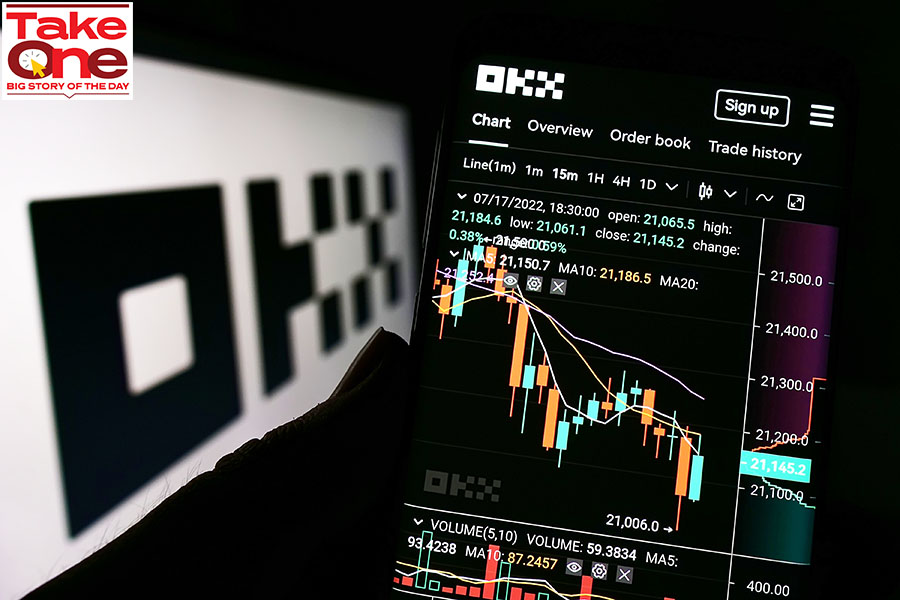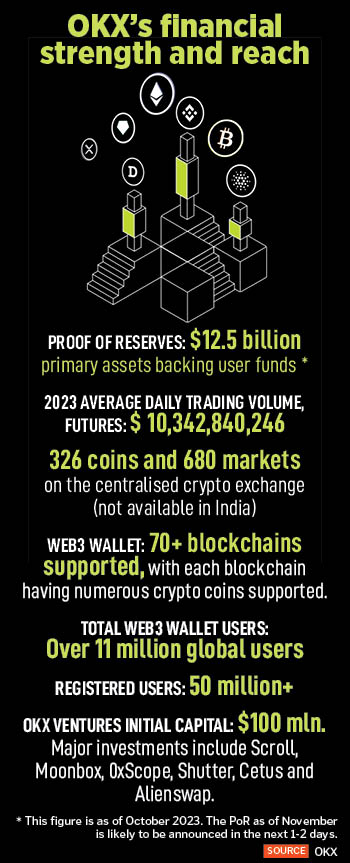
Global crypto exchange OKX strengthening its India Web3 presence
At a time when other global crypto exchanges are facing the heat, OKX in India is focussed on its role as an incubator to build the Web3 ecosystem and have a deeper product engagement with Polygon
 Image: Shutterstock
Image: Shutterstock
For OKX, the world’s second-largest crypto currency exchange by 24-hour trading volume, and which, since 2021, positions itself as a Web3 technology company, it is business as usual and its march towards gaining a global footprint continues. The exchange has, in November, launched its crypto exchange and Web3 wallet platform in Brazil. It has already applied for a virtual asset trading platform (VATP) license through its Hong Kong branch, which it hopes to receive in coming months. This comes at a time when the G20 nations have endorsed the recommendations of the Financial Stability Report (FSB) towards regulation of crypto assets.
OKX is strengthening its India presence also, particularly in the Web3 space, where the concentration of engineers, product people, entrepreneurs and developers thrives in India. But it comes in an environment where global investing in Web3 startups has slowed in 2023, compared to a year earlier.
“The youth in India have a natural gravitation towards STEM education. Beyond Silicon Valley and China, Indians have built knowledge systems with technology and software. As Web3 emerges, engineers, product experts, entrepreneurs and developers are thriving in India. We've seen much of the traffic to Web3 companies and active users come from India. Seeing this data made us go down the rabbit hole of exploring India,” says Haider Rafique, a spokesperson for OKX’s India operations and the exchange’s chief marketing officer.
Web3 incubator & Polygon alliance
OKX plans to work on three fronts in India. It will start by fostering the Web3 community in India. “We may also explore if we can serve as a small incubator or do some developer funding in India where we can provide grants ranging from $25,000 to $75,000 for promising Web3 projects,” says Haider. OKX has already sponsored events in more than 400 colleges in India to build branding and education, and to explore if they can be part of a developer or engineer’s journey.OKX is also exploring how best to work with the Polygon chain. Polygon, formerly known as Matic Network, provides as easy framework for new and existing blockchain projects to build on Ethereum without scalability issues. “We are collaborating closely with their product teams to attract more Web3 applications to the Polygon and OKX ecosystems. I believe Polygon has done a great job with scalability, and partnering together can create a tonne of utility for Web3 natives,” Haider tells Forbes India. Also read: Evolution of marketing in Web3: Leveraging decentralization for success
OKX, on November 14, announced the launch of a new Zero Knowledge (ZK) Ethereum Layer 2 network called X1, which is built using Polygon's Chain Development Kit (CDK). OKX will become a core contributor to Polygon's CDK and will dedicate substantial resources, including engineering, to enhance this technology stack. This will collectively push the boundaries of ZK-powered L2 technology, which ultimately benefits the OKX, Polygon and Ethereum communities because the network will be faster and transactions will be cheaper. This will help achieve scale.
OKX will also work with developer student bodies in India and partner with them to help them explore its global platform or be part of its developer ecosystem. OKX may also seek to fund some of their programmes and plans to spend $1million on developer grants and advertising in India in the next 12 months.
 Polygon Co-founder Sandeep Nailwal tells Forbes India: “OKX’s Web3 expansion into India will undoubtedly result in a considerable boost not only to the local Web3 ecosystem but to the global crypto industry as a whole. Ultimately, adding value is one of the core objectives OKX has already stated when announcing its expansion.”
Polygon Co-founder Sandeep Nailwal tells Forbes India: “OKX’s Web3 expansion into India will undoubtedly result in a considerable boost not only to the local Web3 ecosystem but to the global crypto industry as a whole. Ultimately, adding value is one of the core objectives OKX has already stated when announcing its expansion.”But OKX will not be launching its crypto exchange in India. “We respect local market regulations. We won't make any of our centralised exchange products available in India at this time,” Haider says. The crippling fall in trading volumes in India, as customers have left domestic exchanges to trade on overseas platforms, has forced existing crypto exchanges in India to rethink their business models over the past two years. And it is unlikely to change soon.Also read: Web3 and blockchain gaining traction in India, startups seek regulatory clarity
The Reserve Bank of India Governor Shaktikanta Das has reiterated the central bank’s stance to ban crypto. India’s Minister of Finance Nirmala Sitharaman has called for creation of a framework to deal with regulation of crypto currencies, calling it “work-in-progress”. It is believed to be creating a foundational framework to prevent the misuse of crypto currencies and amplify the global anti-money laundering (AML) capabilities, according to media reports.
Haider says OKX is in the “experimental stage” of developing its products in India. “Web3 is still trying to find a product-market fit globally, though the philosophy is well accepted,” he says. He forecasts that who wins in the infrastructure game (of developing the pipeline) are those who are a little more established and can invest more in that segment.
Different positioning
The meteoric rise and equally sharp fall of US entrepreneur Sam Bankman-Fried—the bankruptcy of his exchange FTX in 2023, and the turmoil at its rival Binance, which chose not to acquire FTX in late 2022—have continued to keep regulators and investors guarded about governance and leadership concerns at these exchanges. Haider and OKX declined to comment on the events which have been playing out at FTX and Binance.In recent months, some crypto exchanges have run into legal battles with regulatory agencies. Binance has pleaded guilty to settle criminal money laundering charges made by the SEC against it in June 2023. Another crypto exchange, Coinbase, has been losing market share in Ethereum trading, as investors are turning wary of facing regulatory risks while using the exchange’s staking service.
The SEC had accused Coinbase of operating its crypto asset trading platform as an unregistered national securities exchange, broker, and clearing agency. It was also accused of failing to register the offer and sale of its crypto asset staking-as-a-service programme. Staking-as-a-service is a way for an intermediary to offer validation service by service-pooling and staking tokens from several individuals.
OKX has been in a sweet spot compared to other exchanges by doing a few things differently. It has been more transparent by providing a monthly proof of reserves (PoR) ratio against customer funds. Binance has now been providing monthly PoRs. Improved transparency is not only useful for retail investors, but also all stakeholders including institutions, regulators and politicians. The fact that OKX has shared a non-threatening relationship with regulators has helped it. Also, since 2021, it has rebranded and positioned itself more as a technology company rather than an exchange. “OKX thinks and acts like a technology company,” Haider says.Also read: Indian state governments embrace blockchain in public administration
The last report of the exchange, dated October 24, shows $12.5 billion in primary assets backing user funds. OKX is expected to report the latest set of PoR in the next couple of days. The company has disclosed that its average daily trading volume (in futures) in 2023 is $10,342,840,246 and $1,113,061,793 for spot trading. OKX’s market share has significantly risen in 2023, to 11 percent in July 2023, nearly doubled from January, according to Bloomberg.
Crypto regulations to widen
Even as OKX goes about expanding its India operations, Haider believes it is only natural to see crypto regulations developed in different jurisdictions. “Our view is regulations will begin from a narrow vantage point before they widen to include the vast crypto ecosystem. Regulation is about consumer protection while also allowing for innovation. Ultimately, we expect a rise in decentralised products that give people access to the Web3 world,” he says.With over 450 Web3 startups already active and roughly 75,000 blockchain professionals, India has one of the fastest-growing Web3 ecosystems in the world and is perfectly positioned to become one of the biggest and most thriving Web3 territories in the future.
“With the sheer number of developers in India, it is inevitable that the Indian ecosystem becomes a significant contributor to the Web3 ecosystem on a global scale,” says Polygon’s Nailwal.
Haider has a dream of being part of a unicorn which emerges out of either China or India. “Two kids in a garage somewhere, part of an incubator programme, who are going to unlock consumer application on top of de-centralised sub-custody experiences that become the face of consumer Web3,” Haider visualises. OKX is helping foster this vision.
Post Your Comment


















